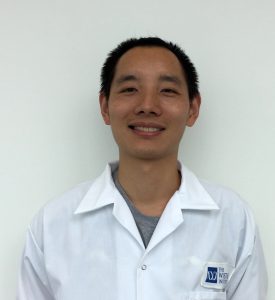2019 Mentored Investigator Grant Recipient — Shuai Wu, PhD
Project Summary
Epithelial ovarian cancer (EOC), which accounts for about 90% of ovarian cancers, is the most lethal gynecological malignancy in the United States. Ovarian Clear Cell Carcinoma (OCCC) is a histological subtype of EOC characterized by resistance to chemotherapy. Compared with other subtypes, OCCC typically has a low response rate to the platinum-based standard of care for EOC. OCCC is associated with the worst prognosis compared to other EOC subtypes when diagnosed at advanced stages. The discovery of somatic ARID1A mutations in over 50% OCCC was a major advance in this histosubtype. Loss of ARID1A correlates with late-stage disease and predicts early recurrence. However, there is currently no effective therapy based on ARID1A mutation for this disease. The aim of this proposal is to develop a novel approach to target ARID1A mutation in ovarian cancer.
ARID1A is the DNA binding subunit of the SWI/SNF chromatin-remodeling complex. This complex plays a pivotal role in the maintenance of chromatin structure and gene expression via controlling chromatin accessibility. Established data suggests that the SWI/SNF complex functions as a tumor suppressor. Over 90% of the ARID1A mutations result in loss of ARID1A expression in OCCC. However, loss of ARID1A cannot be directly druggable by conventional inhibitors. My preliminary data shows that ARID1A loss leads to upregulation of an anti-apoptotic gene signature among ARID1A direct target genes, meaning it prevents cell death (apoptosis). For example, anti-apoptotic BCL2 is a direct ARID1A target gene whose expression is higher in ARID1A deficient vs. ARID1A proficient OCCCs. This suggests that ARID1A represses BCL2 expression. Consistently, ARID1A deficient cells are hypersensitive to clinically applicable BCL2 inhibitors such as ABT-263. This suggests that ARID1A-mutated cancer depends on anti-apoptotic signals for both survival and growth. Thus, I hypothesize that ARID1A-mutated OCCC can be selectively eliminated by targeting anti-apoptotic signaling using clinically applicable BCL2 inhibitors. A challenge in targeted therapy is the development of resistance to a single agent treatment. Combinatory approaches are effective ways to prevent and/or overcome single agent resistance in cancer. Our previous studies established that the inhibition of EZH2 activity is synthetically lethal with ARID1A mutation in OCCC. Interestingly, my preliminary data indicate that the anti-apoptotic signature such as BCL2 is also upregulated in ARID1A-mutated OCCC cells that developed resistance to EZH2 inhibitors. Thus, I propose that a combination of EZH2 inhibitors and BCL2 inhibitors will be synergistic in suppressing the growth of ARID1A-mutated OCCCs.
This proposal aims to elucidate the molecular mechanism underlying the sensitivity to BCL2 inhibition and develop a novel combinatory therapeutic approach for ARID1A-mutated ovarian cancer. Since both a clinically applicable EZH2 inhibitor and BCL2 inhibitor are readily available, this therapy will likely have an immediate benefit on OCCC patients.
This research has been generously supported by Ovarian Cycle, Chicago, IL.
Bio
Dr. Shuai Wu is currently a postdoctoral fellow in the laboratory of Dr. Rugang Zhang at The Wistar Institute in Philadelphia. He received his Ph.D. degree from Shanghai Institute of biochemistry and cell biology, Chinese Academy of Science. As a Ph.D. student, he was awarded merit student of Chinese Academy of Science. With great interest in the epigenetic basis of ovarian cancers, Dr. Wu joined Dr. Rugang Zhang’s lab in 2015.
His current research focuses on synthetic lethality approaches to ARID1A mutation in ovarian clear cell and endometrioid carcinomas. In particular, Dr. Wu is interested in exploring combinatory therapeutic approaches based on synthetic lethality for ARID1A-mutated ovarian cancers. In addition, he is interested in the role of anti-apoptotic pathway in mediating resistance to synthetic lethality based therapeutic strategies in ARID1A-mutated ovarian cancers. The ultimate goal of Dr. Wu’s research is to develop the first effective therapy against ARID1A-mutated ovarian cancer, an unmet challenge in clinical management of ovarian cancer.
